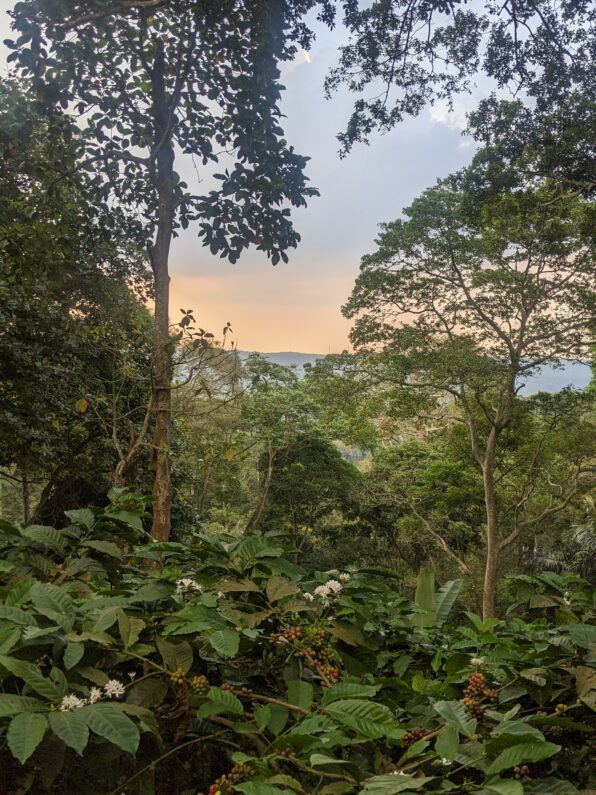
Shade-grown coffee demonstrates the benefits of combining agriculture and conservation, an Oxford Brookes University study reveals
Increasing shade cover over coffee plants can increase biodiversity and provide new ways to combine agriculture and conservation, a new study has revealed.
Coffee grown in high shade, with more than 30% canopy cover, provides a home to more plant and animal species than coffee grown in the sun or on low shade farms with less than 30% canopy cover, the study found.
Preserving biodiversity is good news for farmers as it means better natural pest control, and improved soil quality. The quality of the coffee produced also actively improves with increased shade.
Sophie Manson, a PhD student and the lead author, led a team from Oxford Brookes University’s Nocturnal Primate Research Group Team. Ms Manson said: “Agriculture is one of the greatest threats facing species around the world. Whether it is cutting down trees to make way for farms, or using chemical pesticides and fertilisers, bad farming practices can hold dire consequences.
“Yet it doesn’t have to be this way. Paving the way in combining agriculture and conservation, shade-grown coffee has the ability to challenge our perception of agriculture, and reframe the way we look at farming. Weaving agriculture into conservation initiatives, through practices such as shade-grown coffee, will enable countries to reach biodiversity targets and maintain their rich cultural and ecological heritage.”
Dr Marco Campera, a co-author on the paper, said: “We showed that several groups of species with important roles for ecosystems and humans, such as pollinators, are penalised by shade tree removal. This in turn can lead to a loss in profits for farmers and cause management costs to increase through agrochemicals. Therefore, traditional ways of cultivating coffee and other non-timber forest products, such as growing them under shade, should be prioritised.”
The research began with keyword searches of relevant academic research into the effects of shade on biodiversity in coffee farms. Specific criteria were then used to analyse 1,900 relevant research papers on the subject.
The Nocturnal Primate Research Group Team, which has one major project that focuses on West Java, Indonesia, also found some species, for example mammals like slow lorises, and plants such as ferns and orchids, need high shade to survive.
Co-author, Professor Anna Nekaris OBE, Professor in Primate Conservation at Oxford Brookes University, said “What this means is that if we are wanting to conserve mammals and air-purifying ferns and orchids, we can only do that in areas of high shade. Low shade simply isn’t enough.”
The study also noted that location is vital when considering shade cover. Studies in Latin America indicate that species diversity increases in farms with higher canopy cover, studies in Africa showed the opposite trend.
Ms Manson said: “What may work in one place may not apply elsewhere – a rule to bear in mind when considering any conservation initiative.

“The study shows the benefits of shade-grown coffee and we are keen to promote the benefits. However, this can only be done on the understanding that further destruction of forests for any forms of agriculture will render the value of shade-grown coffee entirely redundant. Our focus now should lie in conservation and how we can optimise productivity alongside biodiversity.”
More in Education

Unleash Your Potential: AI & Innovation Summer Camp at Cherwell College...
In an ever-evolving world where innovation drives progress, equipping oneself with cutting-edge skills becomes paramount. Cherwell College Oxford proudly presents its AI & Innovation Summer Camp, a transformative journey designed to empower young minds with the tools and insights needed to thrive in the digital age. Here’s why this programme is a must for aspiring innovators:

Shaping Modern Education:Cherwell Launch Pioneering Fast-Track A-Level Programme tailored to meet...
Tuesday 7th May: Cherwell College Oxford are shaping modern education, by launching a Pioneering Fast-Track A-Level Programme tailored to meet the demands of the 21st Century.

Art and design students team up with top sustainable fashion designers...
Oxford Brookes University students gained real life fashion industry experience by creating and building a set for two top British designers as part of London Fashion Week 2024.
From this author

Paris’s legacy
As the curtain closes on the Paris Olympic Games, the event leaves behind a legacy rich in sporting memories.

Olympic Glory for Brookes Athletes
Athletes from Oxford Brookes University Boat Club (OBUBC) powered to thrilling Gold and Bronze medals in two rowing events at the Paris Olympic Games.

Art and design students team up with top sustainable fashion designers...
Oxford Brookes University students gained real life fashion industry experience by creating and building a set for two top British designers as part of London Fashion Week 2024.


